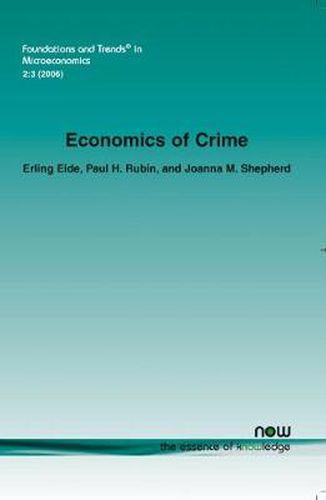Readings Newsletter
Become a Readings Member to make your shopping experience even easier.
Sign in or sign up for free!
You’re not far away from qualifying for FREE standard shipping within Australia
You’ve qualified for FREE standard shipping within Australia
The cart is loading…






Economics of Crime presents the basic model of criminal behavior and law enforcement. The authors start by reviewing the economics of criminal behavior. Models of criminal behavior applying the model of individual rational behavior are presented. Empirical studies surveyed use regression analyses and employ data from states and police regions down to individuals. These studies tend to support the hypothesis that the probability of punishment and the severity of punishment have a deterrent effect on crime.
Methodological problems relating to the assumption of rationality, statistical identification of equations, measurement errors, and operationalization of theoretical variables are discussed. Economics of Crime also review the theory of public enforcement including probability and severity, fines and imprisonment, repeat offenders, incentives of enforcers, enforcement costs and enforcement errors.
This book is intended for economists and lawyers, practitioners, scholars and students in the field of law and economics, microeconomics, and criminology who wish to learn the basics of the economics of crime, criminal behavior, and law enforcement.
$9.00 standard shipping within Australia
FREE standard shipping within Australia for orders over $100.00
Express & International shipping calculated at checkout
Economics of Crime presents the basic model of criminal behavior and law enforcement. The authors start by reviewing the economics of criminal behavior. Models of criminal behavior applying the model of individual rational behavior are presented. Empirical studies surveyed use regression analyses and employ data from states and police regions down to individuals. These studies tend to support the hypothesis that the probability of punishment and the severity of punishment have a deterrent effect on crime.
Methodological problems relating to the assumption of rationality, statistical identification of equations, measurement errors, and operationalization of theoretical variables are discussed. Economics of Crime also review the theory of public enforcement including probability and severity, fines and imprisonment, repeat offenders, incentives of enforcers, enforcement costs and enforcement errors.
This book is intended for economists and lawyers, practitioners, scholars and students in the field of law and economics, microeconomics, and criminology who wish to learn the basics of the economics of crime, criminal behavior, and law enforcement.